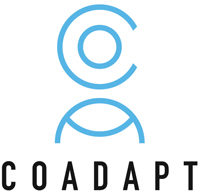This adaptation type develops a prototype of proactive entity recommender system as a Web application running on laptop/desktop computer. This recommender system is able to help knowledge workers in performing their digital tasks by reducing the amount of time spent on search tasks and extracting the most relevant entities. The main aim is to study whether smart adaptive systems that learn what users do and what tools and information they need, can support the work ability of ageing workers by investigating exchange of computer use such as applications and social mediated interaction between the CO-ADAPT application and the Proactive Recommender.
Overview : This task involved eight highly educated individuals (age 22-55) who took part in two participatory design sessions to collaboratively design features and interfaces for proactive recommendation tool that can assist both young and old knowledge workers in everyday information search tasks. The research questions were two-fold: 1) investigating the age-related differences in the type of the information search tasks that the users often encounter and that they feel difficult with the users in three age groups (<35 years old, 35-49, 50-54); 2) collecting design requirements for proactive recommender.
Procedure : Participants were asked to keep a diary reporting the information search tasks that they encountered in everyday activities or search tasks that they felt difficult. Diaries include 3 fields: 1) descriptions about information search tasks, 2) the names of the applications or software on which the search was performed, 3) What makes the search difficult. After a week, participants visited our lab for participatory design sessions discussing around the diary and design features for proactive recommender.
Results : From the reported diaries, there was no age-related difference in the information search tasks that the participants felt difficult between the three age groups. In participatory design sessions, participants could imagine a wide range of recommendation types beyond a regular document retrieval system but recommendations of applications, files, system folders, maps, physical and leisure-related activities. Accordingly the participants proposed features for the proactive recommender including assistance with e-mailing and street navigating, recommendation of web search queries, reminder feature aiding a user in remembering important events, contact feature assisting a user with readily available addresses and phone numbers. From gathered requirements, implications for the design of proactive recommender system were discussed. We created a first functional prototype working on computers and smartphones namely proactive entity recommender (T3.1) that account for the aforementioned features. The recommender system enables quick access to entities such as, applications, files, queries for search, contact persons, street names, project groups, and other available business entities. Desired interfaces of recommender should be unobtrusive and can be put at the bottom of the computer screen or front screen of smartphones and always available to the user.
Based on an experimental proof of concept with basic machine learning methods, this task develops a deployablesystem that provides continuous recommendations for the user of useful entities on a computer, such as contact of colleagues, documents, applications based on the users current task. Digital activities are continuously monitored by capturing all content on a user's screen using optical character recognition including all windows visible on the computer.
In this task cooperate AALTO – task leader with UH which works on user interface implementation.
